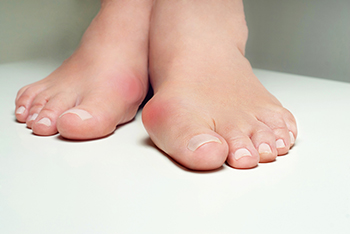
Bunions are bony bumps that form at the base of the big toe, causing it to deviate toward the other toes. This misalignment can lead to pain, swelling, and redness surrounding the joint. Symptoms often include a pronounced bump on the side of the foot, discomfort while walking, and restricted movement of the big toe. Bunions are typically caused by inherited foot structure abnormalities, but they can also result from or made worse by wearing tight or ill-fitting shoes that compress the toes. High heels and narrow-toed shoes are common culprits. Other contributing factors include arthritis and prolonged pressure on the feet. Early intervention with proper footwear, orthotic devices, and, in severe cases, surgery can alleviate symptoms and prevent further progression. A bunion can be painful and unsightly. If you have developed this foot condition, it is suggested that you visit a podiatrist who can offer you appropriate relief treatment methods.
If you are suffering from bunion pain, contact the foot specialists of Academy Foot and Ankle Specialists. Our doctors can provide the care you need to keep you pain-free and on your feet.
What Is a Bunion?
Bunions are painful bony bumps that usually develop on the inside of the foot at the joint of the big toe. As the deformity increases over time, it may become painful to walk and wear shoes. Women are more likely to exacerbate existing bunions since they often wear tight, narrow shoes that shift their toes together. Bunion pain can be relieved by wearing wider shoes with enough room for the toes.
Causes
- Genetics – some people inherit feet that are more prone to bunion development
- Inflammatory Conditions - rheumatoid arthritis and polio may cause bunion development
Symptoms
- Redness and inflammation
- Pain and tenderness
- Callus or corns on the bump
- Restricted motion in the big toe
In order to diagnose your bunion, your podiatrist may ask about your medical history, symptoms, and general health. Your doctor might also order an x-ray to take a closer look at your feet. Nonsurgical treatment options include orthotics, padding, icing, changes in footwear, and medication. If nonsurgical treatments don’t alleviate your bunion pain, surgery may be necessary.
If you have any questions, please feel free to contact our offices located in Southlake, Keller (Fort Worth), Hurst, North Richland Hills, Flower Mound, Argyle, and Denton, TX. . We offer the newest diagnostic and treatment technologies for all your foot care needs.
